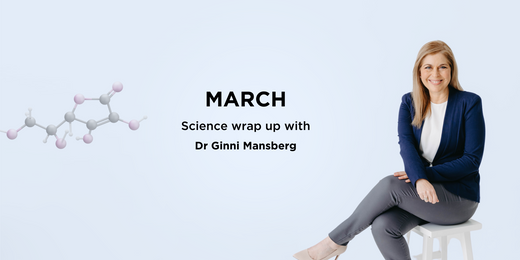
Science Hub
March 2024 Science Wrap Up
30 March 2024
Dr Ginni Mansberg
Hello and thank you for checking out our Science Wrap for March 2024. Depending on where you’re reading this science wrap you’re either welcoming in the first blooms of Spring or kissing summer goodbye and embracing Autumn time. Change of season can be tough on your skin. We can see you get drier, itchier, break out and generally have to give your skin a little TLC. One thing you might want to consider is the pH of your skincare! It’s the first thing I have covered for our latest science wrap!
pH in your skincare matters!!
At ESK we are obsessed with the pH of your skin- what it should be, how to keep it that way and how to use skincare to help make or break your skin’s pH. A new study published in the Annals of Dermatology emphasizes the importance of skin pH- YET AGAIN!!! This time- it’s all about the relationship between skin pH and skin barrier!! Your skin barrier function relies on three essential components: stratum corneum fats, natural moisturizing factors (NMFs), and the acidic pH of the stratum corneum. An acidic stratum corneum boosts the activity of enzymes essential for making ceramides, which are vital for skin health. While a higher or alkaline pH can impair your skin’s barrier function, due to poorer wound healing and less cohesion of the skin barrier due to a higher serine protease (SP) activity, which breaks down that brick and mortar structure. Your skin’s pH is determined by your genes, your age, whether or not you produce a lot of sebum or have conditions like diabetes. But the authors point to skincare as a culprit for rising skin pH, too. “Mild acidic skin care products or moisturizers … can normalize skin pH and improve barrier function,” the authors conclude. If your skincare brand doesn’t tell you the pH of their products, call or email and ask. No need to do that at ESK. We declare the pH of every product on our website!
Exosomes for hair loss- cutting edge, BS or a bit of both?
When we were in London for the Menopause in Aesthetics conference, I attended a lecture ab-out the use of exosomes for hair loss. It was sold as a certainty. I was intrigued. So when a review article was published in the latest issue of the Journal of Drugs in Dermatology, I almost choked on my coffee to read it! Exosomes, also called extracellular vesicles (EcVs), are present in almost all cells, tissues, and body fluids. They are basically very complex chemicals that help communication both inside cells and between cells. They help maintain good cell functioning and loss of exosomes has been linked to cell aging. So they are being increasingly studied for their potential anti aging abilities. We get them from human fat cells, bone marrow, placenta, umbilical cord, and foreskin. You can also get them from animal tissues. The authors’ conclusion? Very promising, but the evidence is patchy and so we’re not there yet. In Australia you can sign up for Exosome treatment for hair loss- a package of 4 30 minute sessions for a mere $600 a pop! I’d go for a more evidence based approach.
Thinking of getting a peel for pigmentation? Read this first.
Hyperpigmentation is a very distressing condition for lots of people. So you might be considering booking yourself for a bit of an in clinic peel? Hold that thought for a second. Chemical peels including those using glycolic acid, salicylic acid, Jessner's solution, trichloroacetic acid, lactic acid, and tretinoin along with newer peels like lactic acid, mandelic acid, lipohydroxy acid, amino acid, pyruvic acid, and phytic acid were studied in a review published in the latest edition of the journal Dermatology Clinics. Their conclusion- they do work. With caveats. They’re second line to skin care. And they only work on superficial pigmentation (ineffective for dermal pigmentation.) Usually multiple peels are required. Medium or deep peels shouldn’t be used AT ALL in skin of colour the authors warn, because of the high risk of rebound inflammatory pigmentation and scarring. The gentler peels are less effective. Their parting message; “Patients must be advised to apply a broad-spectrum sunscreen adequately.” Cheers to that!!

